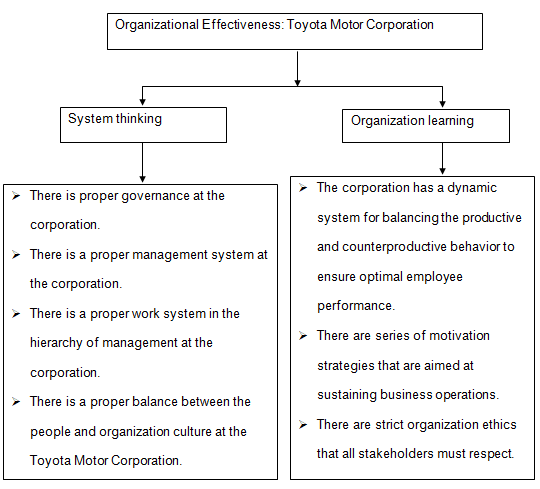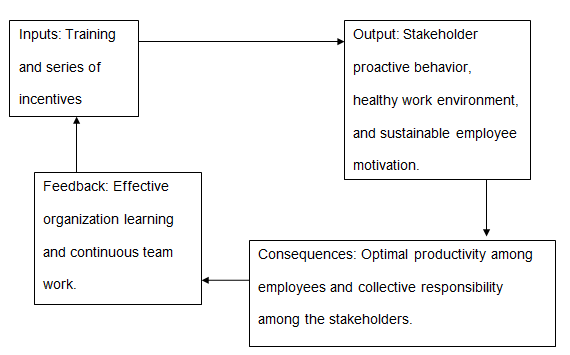Apparently, the Toyota Motor Corporation is an effective organization in terms of balance in the systems, corporate culture, and organization behavior. This is summarized in the table below.

In terms of the people sub-system, the Toyota Motor Corporation has endeavored to balance the aspects of employee training, performance, and feedback to guarantee sustainable business operations as summarized in the table below.
People subsystem

Apparently, the Toyota Motor Corporation has an effective people sub-system since the incentives are properly aligned with the responsibilities of each employee of the corporation. As a result, the Toyota Motor Corporation has recorded optimal performance level as initiated by the continuous learning programs and responsive team work. This has created an ideal learning and work environment at the Toyota Motor Corporation.
Recommendations
It is critical to balance the feedback with the goals of the Toyota Motor Corporation as a remedy towards inclusiveness and active participation, which translate into desirable performance. The policies adopted should be aligned to the basic building blocks of performance and scope of the organization.
These policies should incorporate employee-employer relationship model, performance review, and organizational social culture as discussed below.
Operational efficiency
Operational efficiency and market niche provide an indication of how well the company manages its resources, that is, how well it employs the assets to generate sales and income. It also shows the level of activity of the corporation as indicated by the turnover ratios.
Apparently, the level of activity of the Toyota Motor Corporation has remained relatively stable despite threat of competition, constant change of taste, and varying preferences. In order to stay afloat, the company should streamline its operational costs by outsourcing marketers.
The marketers will operate from their homes to save the company daily expenses of running its business in the foreign countries (Andreadis, 2009). After implementing this proposal, the company will reduce its wage bill and seal the expenditure loop holes.
Consumer Centricity
Properly designed product distribution management facilitates the success and sustainability of the Toyota Motor Corporation’s organization culture. To increase credibility and maintain professionalism, the current channels of reaching the consumers should be tailored to encompass processes and features that flawlessly facilitate a healthy and a lifetime relationship between the business and its clients.
Among the new development elements that the company should incorporate include trust, liability acceptance, distribution, fair retribution process, and passing accurate information to target audience in order to restore confidence within these networks (George & Jones, 2012). This strategy will ensure that the business is sustainable.
Functional team
Essentially, the success of any business depends on proper alignment of a functional team that is responsible for the creation of flexible and quantifiable measurement tracking tools for tracking performance results.
Reflectively, the Toyota Motor Corporation should introduce a functional team with the essential knowledge in sustainable production skills (Andreadis, 2009). This will guarantee sustainable human resource practices and stable labor force.
References
Andreadis, N. (2009). Learning and organizational effectiveness: A systems perspective. Performance Improvement, 48 (1), 5-11.
George, J., & Jones, G. (2012). Understanding and managing organization behavior (6th ed.). New York, NY: Prentice Hall.